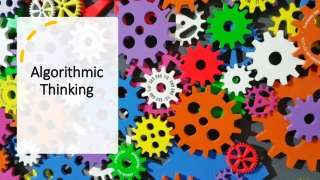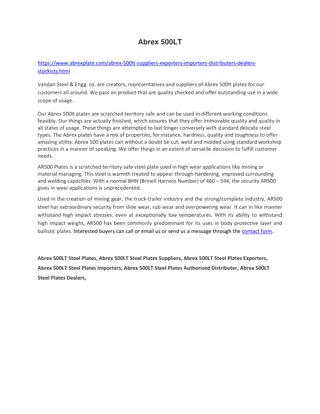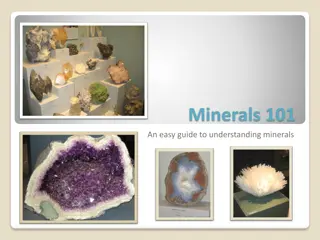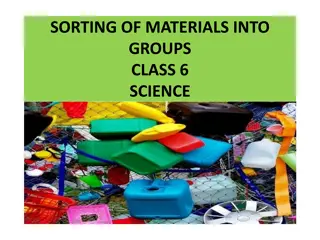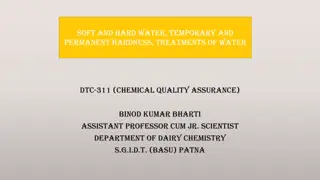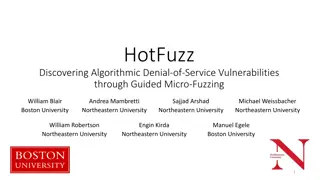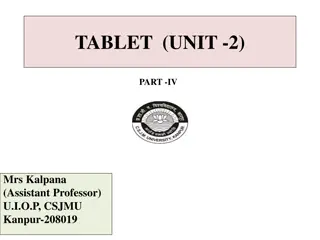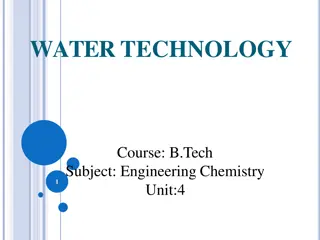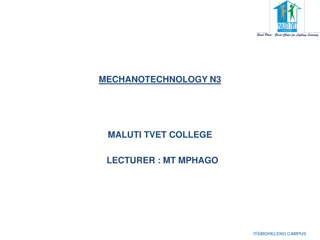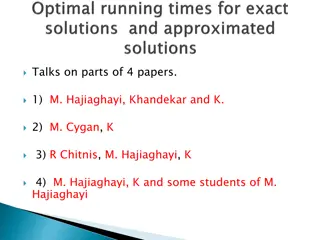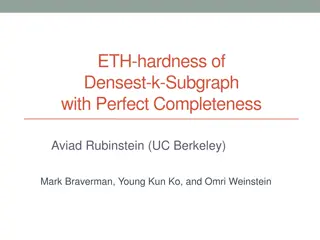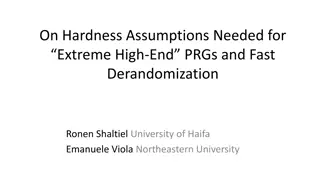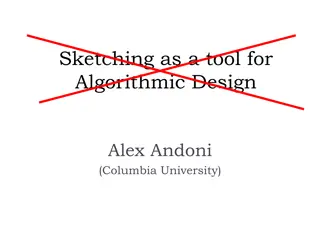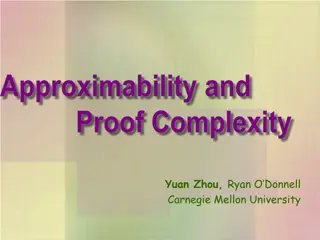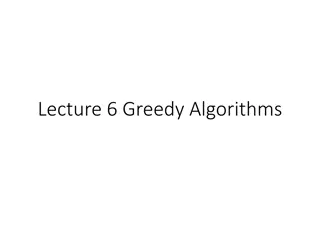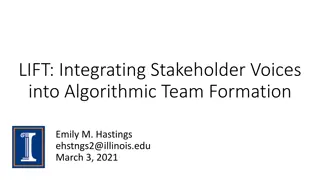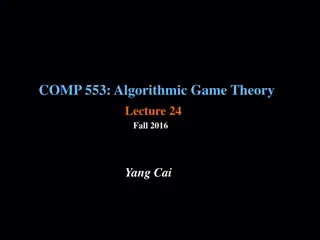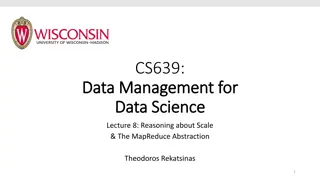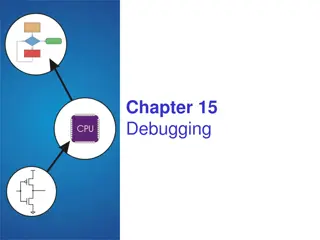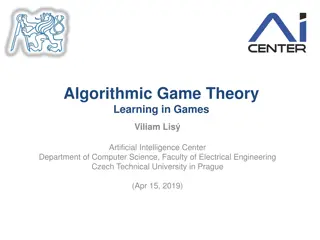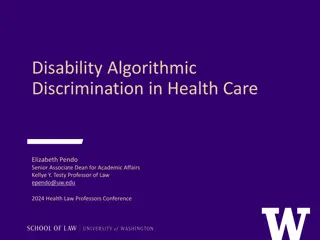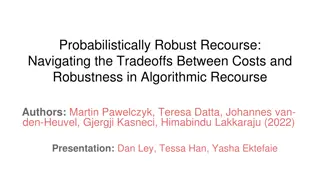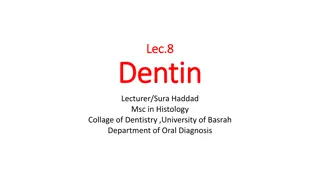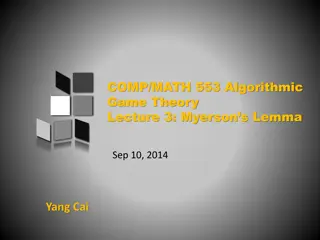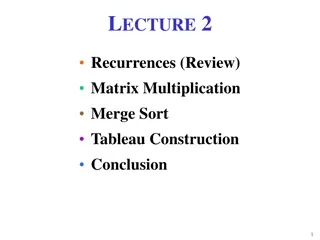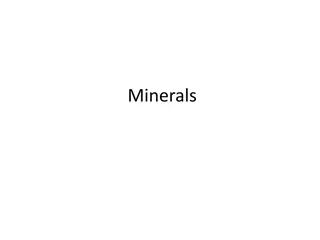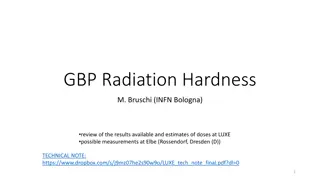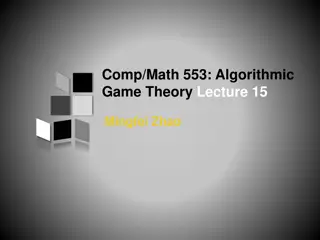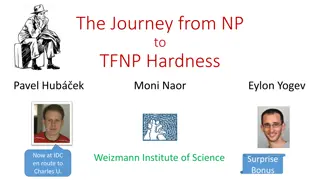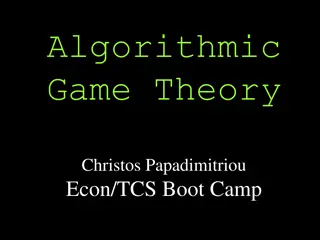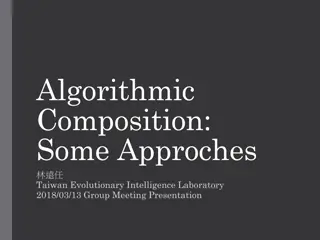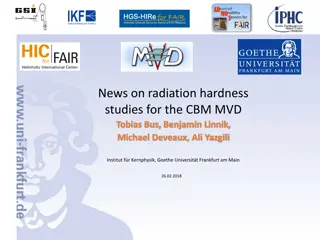Understanding Algorithmic Thinking: Key Concepts and Importance
Algorithmic thinking is a crucial skill that involves problem-solving through precisely defined instructions. This competency, applicable beyond computing, entails analyzing problems, identifying steps to solve them, and designing efficient algorithms. The importance of algorithmic thinking lies in
1 views • 13 slides
Abrex 500LT
Our Abrex 500lt plates are scratched territory safe and can be used in different working conditions feasibly. Our things are actually finished, which ensures that they offer immovable quality and quality in all states of usage. These things are attempted to last longer conversely with standard delic
1 views • 2 slides
Understanding Extracellular Matrix (ECM) and Its Functions
Extracellular Matrix (ECM) is a complex network of proteins, glycoproteins, and macromolecules that provide structural support, regulate cell activities, and play crucial roles in various tissues. It consists of two main types - interstitial matrix and basement membrane, each serving specific functi
12 views • 25 slides
Understanding Minerals: A Comprehensive Guide
Earth's crust is composed of rocks made up of different minerals, which are naturally occurring, inorganic solids with distinct atomic structures and chemical compositions. Minerals exhibit properties like solidity, natural occurrence, inorganic nature, fixed composition, and crystal form. Identifyi
2 views • 20 slides
Understanding Material Classification and Properties in Science
Explore the importance of grouping materials based on their properties, such as appearance, hardness, solubility, density, and transparency. Discover how materials are classified and grouped, benefitting us in organization, efficiency, and study. Learn about the significance of material characterist
0 views • 15 slides
Understanding Water Hardness and Treatment Methods
Water plays a crucial role in the food industry, particularly in the dairy sector. This article explores the types of water, focusing on hard and soft water, and discusses temporary and permanent hardness. It also delves into various treatments for water hardness, such as the cold lime method, base
1 views • 27 slides
HotFuzz: Discovering Algorithmic Denial-of-Service Vulnerabilities
A detailed exploration of algorithmic complexity bugs and insight into distributed micro-fuzzing methods. The study uncovers vulnerabilities through guided micro-fuzzing approaches, emphasizing the importance of AC bug detection and fuzz testing techniques such as seed inputs, fuzz observations, and
0 views • 14 slides
Quality Control Tests for Tablet Production
Quality control tests play a crucial role in ensuring the safety and efficacy of tablet products. This article discusses various parameters like general appearance, size, shape, unique identification markings, organoleptic properties, hardness, friability, weight variation, and content uniformity th
1 views • 11 slides
Understanding the Right to an Explanation in GDPR and AI Decision Making
The paper delves into the necessity for Explainable AI driven by regulations such as the GDPR, which mandates explanations for algorithmic decisions. It discusses the debate surrounding the existence of a legally binding right to explanation and the complexities of accommodating algorithmic machines
0 views • 22 slides
Understanding Water Hardness and Impurities in Water Technology
Water technology in the field of Engineering Chemistry explores sources of water, major impurities, hardness of water, and distinctions between hard and soft water. The content delves into the impact of mineral concentrations on soap lathering, categorizes hardness into temporary and permanent forms
1 views • 72 slides
Evolution of Algorithms and Computer Science Through History
The history of algorithms and algorithmic thinking dates back to ancient times, with the development of general-purpose computational machines by Charles Babbage in the 19th century marking a significant advancement. The term "computer science" emerged in 1959, encompassing theoretical computer scie
1 views • 39 slides
Computational Thinking, Algorithms & Programming Overview
This unit covers key concepts in computational thinking, including decomposition, abstraction, and algorithmic thinking. Decomposition involves breaking down complex problems, abstraction focuses on identifying essential elements, and algorithmic thinking is about defining clear instructions to solv
1 views • 5 slides
Understanding Metals: Properties and Heat Treatment Processes
Metals can be categorized into ferrous and non-ferrous based on the presence of iron. Ferrous metals contain iron, while non-ferrous metals do not. Each type has distinct properties like toughness, tensile strength, elasticity, plasticity, ductility, malleability, and hardness. Heat treatment proces
0 views • 9 slides
Understanding Algorithmic Thinking in Digital Systems
Explore the application of algorithmic thinking in digital systems through the journey of Mike Clapper, the Executive Director of AMT. Learn about recognizing patterns in data, creating algorithms to solve problems, and utilizing information systems creatively. Enhance your knowledge of digital syst
0 views • 56 slides
Insights into Advanced Algorithmic Problems
Delve into discussions surrounding complex algorithmic challenges, such as the limitations in solving the 3-SAT problem within specific time bounds, the Exponential Time Hypothesis, proving lower bounds for algorithms in various scenarios, and exploring approximation ratios in algorithm design. Thes
1 views • 65 slides
Recent Applications of Quasi-Poly Time Hardness in Densest k-Subgraph
Recent applications of the Birthday Repetition technique have demonstrated the quasi-polynomial time hardness in various computational problems, including AM with k provers, Dense CSPs, Free games, and Nash equilibria. These applications also explore the potential implications in signaling theory an
0 views • 18 slides
Insights on Hardness Assumptions for Extreme PRGs
BPP=P requires certain complexity theoretical hardness assumptions. Recent advancements aim for extreme high-end PRGs based on stronger assumptions, presenting challenges in black-box proofing and loss factors. The cost of hybrid arguments for PRGs is analyzed, highlighting the need for qualitativel
2 views • 14 slides
Sketching as a Tool for Algorithmic Design by Alex Andoni - Overview
Utilizing sketching in algorithmic design, Alex Andoni from Columbia University explores methodologies such as succinct efficient algorithms, dimension reduction, sampling, metric embeddings, and more. The approach involves numerical linear algebra, similarity search, and geometric min-cost matching
0 views • 18 slides
Approximability and Proof Complexity in Constraint Satisfaction Problems
Explore the realm of constraint satisfaction problems, from Max-Cut to Unique Games, delving into approximation algorithms and NP-hardness. Dive into open questions surrounding the Unique Games Conjecture, the hardness of Max-Cut approximations, and the quest to approximate the Balanced Separator pr
0 views • 25 slides
Algorithmic Issues in Tracking: A Deep Dive into Mean Shift, EM, and Line Fitting
Delve into algorithmic challenges in tracking tasks, exploring techniques like mean shift, Expectation-Maximization (EM), and line fitting. Understand the complexities of differentiating outliers and inliers, with a focus on segregating points into best-fit line segments.
0 views • 44 slides
Understanding Greedy Algorithms in Algorithmic Design
Greedy algorithms in algorithmic design involve making the best choice at each step to tackle large, complex problems by breaking them into smaller sub-problems. While they provide efficient solutions for some problems, they may not always work, especially in scenarios like navigating one-way street
1 views • 9 slides
Enhancing Algorithmic Team Formation Through Stakeholder Engagement
Integrating stakeholder voices is crucial in algorithmic team formation to ensure a positive team experience, quality outcomes, and high performance. This research explores learner-centered approaches and considers various team formation methods, highlighting their strengths and weaknesses in educat
0 views • 37 slides
Understanding Brouwer's Fixed Point Theorem and Nash's Proof in Algorithmic Game Theory
Explore the foundational theorems of Brouwer and Nash in Algorithmic Game Theory. Dive into Brouwer's Fixed Point Theorem, showcasing the existence of fixed points in continuous functions. Delve into Nash's Proof, unveiling the Nash equilibrium in game theory. Discover visualizations and constructio
0 views • 23 slides
Understanding Scalability and Algorithmic Complexity in Data Management for Data Science
This lecture delves into the concept of scalability in data management for data science, covering operational and algorithmic aspects. It discusses the importance of efficient resource utilization, scaling out to multiple computing nodes, and managing algorithmic complexity for optimal performance i
0 views • 47 slides
Proposal for Directive to Enhance Working Conditions in Platform Work
The proposal aims to address challenges in platform work, including employment status classification and algorithmic management issues. It seeks to improve transparency, fairness, and accountability in algorithmic decision-making, correctly determine employment status, enhance transparency in platfo
0 views • 13 slides
Understanding Debugging in High-Level Languages
Debugging in high-level languages involves examining and setting values in memory, executing portions of the program, and stopping execution as needed. Different types of errors – syntactic, semantic, and algorithmic – require specific debugging approaches. Syntactic errors are related to code l
0 views • 9 slides
Algorithmic Game Theory Learning in Games by Viliam Lis
The content discusses the concept of algorithmic game theory learning in games, covering topics such as online learning, prediction, best response dynamics, and convergence to Nash equilibrium. It explores how simple learning agents achieve equilibrium outcomes and the application of algorithms in v
0 views • 23 slides
Algorithmic Discrimination in Health Care: Protecting Vulnerable Patients
Elizabeth Pendo and Jennifer D. Oliva discuss disability discrimination in health care algorithms, advocating for legal protections under Section 504, ADA, and ACA. Their article proposes strategies to combat algorithmic bias and enhance antidiscrimination efforts in the 2024 Section 1557 final rule
0 views • 13 slides
Navigating Tradeoffs in Algorithmic Recourse: A Probabilistic Approach
This paper introduces PROBE, a Probabilistically Robust Recourse framework allowing users to balance cost and robustness in algorithmic recourse. Users can choose the recourse invalidation rate, enabling more tailored and efficient recourse management compared to existing methods. PROBE enhances cos
0 views • 17 slides
Understanding Dentin: Structure, Properties, and Functions
Dentin is a vital component of teeth, featuring various structural units such as dentinal tubules. This calcified tissue determines tooth shape, hardness, and radiolucency. It plays a significant role in supporting enamel, cementum, and pulp, with dentinal tubules housing odontoblast processes. Dent
0 views • 29 slides
Understanding Myerson's Lemma in Algorithmic Game Theory
Myerson's Lemma is a fundamental concept in algorithmic game theory, particularly in the context of Sponsored Search Auctions. This lecture delves into the application of Myerson's Lemma to ensure truthful bidding as a dominant strategy, maximize social welfare, and maintain polynomial running time
0 views • 19 slides
Understanding Algorithmic Complexity Measures and the Master Method
In this study, we explore key concepts in algorithmic complexity, including recurrences, matrix multiplication, merge sort, and tableau construction. We delve into the Master Method for solving recurrences, examining Cases 1, 2, and 3, and providing solutions for each scenario. Additionally, we disc
0 views • 61 slides
Understanding Minerals: Properties and Identification
Minerals are naturally occurring solid inorganic substances with definite compositions and structures. They are classified based on physical and chemical properties. This content discusses the definition of minerals, the conditions that classify gold as a mineral, distinguishing mineral characterist
0 views • 29 slides
Advancements in Sapphire Detectors for Radiation Hardness Testing and High-Energy Physics Experiments
Reviewing radiation hardness testing, dose estimates, and measurements at LUXE, this content delves into the use of sapphire detectors in high-energy physics experiments. Highlighting sapphire's material properties, such as high radiation resistance, low cost, and specific characteristics, the text
0 views • 13 slides
Algorithmic Game Theory Lecture on Prophet Inequality and Auction Design
In this lecture on Algorithmic Game Theory, Mingfei Zhao discusses the Prophet Inequality and its application to single-item auctions. The lecture covers the concept of Prophet Inequality, strategies to guarantee expected payoffs, and different auction designs such as the Bulow-Klemperer Theorem and
0 views • 10 slides
Insights into TFNP Hardness and Complexity from Various Perspectives
Delve into the realm of TFNP hardness and complexity through discussions on the journey from NP to TFNP, TFNP total function NP, barriers for proving TFNP hardness, Impagliazzo's Five Worlds, and more. Explore the nuances of NP, coNP, P, and NP completeness while pondering the weakest assumptions un
0 views • 36 slides
Evolution of Algorithmic Game Theory in Computer Science
The evolution of Algorithmic Game Theory (AGT) in the realm of Computer Science showcases the intersection of economics and theoretical computation. Before 1995, notable researchers like von Neumann and Megiddo laid the foundation for AGT. Concepts such as computation as a game, bounded rationality,
0 views • 62 slides
Exploring Algorithmic Composition Techniques in Music Generation
Algorithmic composition involves the use of algorithms to create music, mimicking human composers by generating music based on specific rules and structures. This presentation delves into various approaches such as DeepBach, MuseGAN, and EMI, highlighting the use of evolutionary algorithms, machine
0 views • 35 slides
Welding Heat Flow and Cooling Rate Calculations
Understanding welding heat flow and cooling rate calculations is essential for determining the critical cooling rate in welding processes. Factors such as plate thickness, number of passes, and relative plate thickness play a crucial role in selecting the appropriate equations for calculating coolin
0 views • 10 slides
Monolithic Sensors for Radiation Hardness Studies in CBM MVD
High-tech advanced monolithic sensors are pivotal in conducting radiation hardness studies for the CBM MVD project. Leakage currents, radiation tolerance, and measurement techniques are explored, providing insights into current challenges and potential solutions in sensor technology development.
0 views • 8 slides
